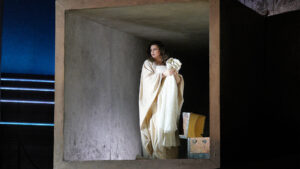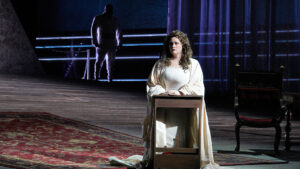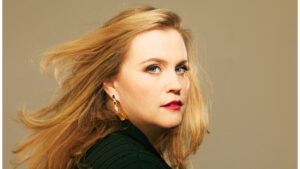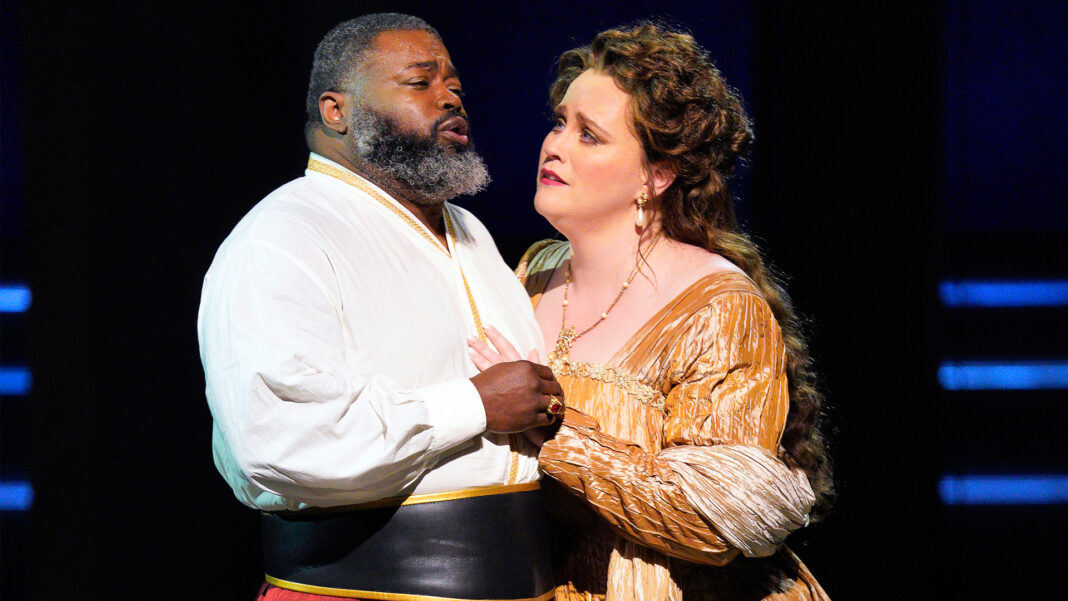This weekend the LA Opera has the first of their last three performances of Verdi’s Otello. It’s a production that has impressed audiences and critics alike. Tenor Russell Thomas plays the troubled and susceptible Moor who is led to believe that his wife, Desdemona, has been unfaithful to him. Rachel Willis-Sørensen sings the role of Desdemona.

This is Willis-Sørensen’s third production of Otello. She has sung in a wide range of operas from Puccini to Wagner to Beethoven. She recorded the final aria from Otello for her album Rachel, which was released last year. Two months ago she released her second album, Strauss: Four Last Songs by Richard Strauss.
I recently spoke with Willis-Sørensen about Otello and her various experiences with it, the present-day resonance the opera has and the experience of performing Otello with a Black singer in the title role. What follows are excerpts from my conversation with Willis-Sørensen that have been edited for length and clarity. To see the full interview, please go to our YouTube channel.
How much does the philosophy expressed in Bird Set Free by Sia, where she says, “Sing for love, sing for me,” resonate with you as you’re preparing yourself before going on stage?
I love that song. My daughter actually showed it to me. It’s so beautiful. “I don’t care if I sing off key. I found myself and my melodies. I sing for love. I sing for me. I let it out like a bird set free.” That’s what it feels like to me when I’m singing. There’s this incredible freedom of expression. Everyone is sitting there looking at me and it’s like I’ve been given the platform to express myself. It’s just the most incredible feeling.
To me there’s something more valuable in expressing something honest than in doing it perfectly. I’ve been varying degrees of toxic perfectionist all my life. With singing the best performances I’ve ever given, I would never say they are the ones that were the most technically perfect. It’s more the ones where I accessed something very real and shared it with the audience. That’s where I feel the most rewarding fulfillment.
Can you tell when you’re in a good production versus when you’re in one that isn’t working as well?
Yes. I’ve been wrong a couple of times, to be fair. I mean, no one’s perfect! But generally when the story is discernible, it’s legible – so to speak from the audience perspective – it’s going to be a good production. If it is not, then it’s going to be a concert with some weird, confusing nonsense happening in front of the audience. Which is not my favorite, obviously, given that I described it that way. It’s hard. I don’t envy a director the task of trying to coordinate all of those multitudinous moving parts.
This is your third production of Otello. How much does a production itself influence your approach to the role?

I’m finding that each nuance that I learn from an old production sort of informs the next one. It’s only my third. But it seems if you are asked to look at something from a different perspective, potentially it enriches your viewpoint on the role. Then depending on the flexibility of the director or the amount of time, you can really hone something.
I think it’s never identical. There are no two performances that are identical. The first production was very traditional. I think making a role debut in a production like that is a gift because you’re just doing the show, you’re just telling the story as well as you can, which is always ideal for a role debut.
The second production that I did was very modern in Munich and the take on the character was so different. I find that the strength of presentation from the second has informed this third one significantly. This is more traditional, but I think that my telling from day one has become a lot stronger than it was previously.
LA Opera conductor James Conlon is a passionate fan of Verdi’s. Are you that passionate about Verdi as well?
Absolutely. I’m in a very fortunate position where I get to sing a wide variety of repertoire, probably wider than is normal to do you could argue. But Verdi is certainly, if not my absolute favorite, then somehow among the top two favorite composers to sing. It’s just written in such a grateful way and the characters are always really interesting to play. I just love it. It suits my throat. I find singing Verdi feels very physically satisfying. Very often you die in the end, which is nice in a weird way. I mean, it makes you really think about your own mortality to die on stage. It makes you more grateful to be alive, but also the act of doing this somehow…I don’t know. I almost recommend it as a therapy, enacting your own death physiologically and then trying to lie there.
Let’s talk about Desdemona’s death. The audience is led to believe that Desdemona has been killed. Then she seems to come back to life to sing her final passage in the opera before she does die. How do you navigate something like that to make it the serious moment it needs to be?
She’s dead. She’s not dead. Wait, is she dead? I know it’s very strange. It’s not very logical. Maybe it wasn’t common knowledge that it takes 3 to 5 minutes to choke a person. But I think [Otello’s] just knocked her unconscious. Clearly something is physically wrong enough that ultimately she dies from it. But she comes two for a second after the fact.
After the physical struggle, I don’t want to think. I want it as absolutely clean as possible. So that’s what I’m trying to focus on during those moments. Then I just try to not breathe visibly for the rest of the show.
Sonya Yoncheva said in 2015 about this role, “Desdemona is a strong woman who knows exactly what she’s doing. The only thing that escapes her is the level of craziness attained by Otello. I personally think she’s very brave. Her greatest strength is her love for Otello. She defends her love, her man, to the very end.” History has not really viewed the character that way. She is viewed more as a tragic victim. Where do you find her?
I think she’s strong in that she marries Otello against her parents wishes. She’s somehow emotionally healthy enough to believe she didn’t have a poor relationship to her parents. She didn’t escape them to marry Otello. They didn’t want her to marry him. She was so in love that she made this decision to stand by him and run away with him. That represents some kind of chutzpah, right? Who does that?

But her love for Otello is so big. His specificity, his difference from all the other men she’s interacting with, I think is part of what contributes to that. She is a tragic victim. I just don’t see her as weak because I think it’s too easy to say that only weak people become the victims of abuse. I don’t think in the real world that’s how that plays out. When your tenderness is taken advantage of by another person, in whatever way, that could basically happen to anyone. It takes so much to be able to stand up to an abuser if they are someone you love.
So I think it’s a very relevant story. We have to feel like it’s a terrible mistake, it’s a terrible misunderstanding, and that Otello has done something very wrong.
I also think there’s something even more topical than that, which is the whole idea that lies take on a truth of their own. If you repeat something often enough, you get a huge percentage of people to believe you. Social media is a hotbed of complete and utter falsehoods.
It’s enough just to have an accusation. That’s enough to ruin you. Just the accusation. There doesn’t have to be any proof. There doesn’t have to be any investigation as soon as an accusation is made. That is another part of the story that’s really relevant.
I have three little children: a nine-year-old daughter and twin sons who are almost eight. My son was saying to someone, “It’s okay if you like something and I like something different. We can both like different things and still be good friends.” We can have divergent opinions and not be accusing one another of stupidity. That’s a beautiful notion that I’m trying really hard to teach my children. I think that’s really missing in public discourse.
What was once acceptable in opera for this role is no longer acceptable. Your other Otellos were not Black performers/singers. Creatively does it make a difference to see Russell Thomas, a Black man as Otello, singing opposite you? Do you think it’s important that that continue to be what is done on opera stages?
I have loved working with all of the Otellos that I’ve worked with. They have been very impressive and interesting storytellers. I think that Russell also is an incredible storyteller. I think he has experience to access in order to tell this role in a different way based on being an actual Black man. So when he talks about being a Black man among white people – I think they water down for the supertitles – but it’s something that he is able to tell in an different way. He’s very passionate and he’s a wonderful colleague. Singing with him is a joy.

I’m not entitled to have an opinion on the controversy because I am a white woman. But I do think that what differentiates opera from other art forms is the singing. At any given time in the world there may be five men who can do the role of Otello. So to make their skin color be requisite, we will just never get to do the piece.
I think Aida is the same. There are actually a few really wonderful African-descent singers who could sing either really well and they should do it. For that reason, I’m nervous about undertaking that task myself, even though it’s been offered a couple of times, because I don’t want to be part of the controversy.
It just doesn’t have an easy answer. In the productions I’ve done where we altogether ignored it, it’s fine. We’re still telling a story about jealousy. It just becomes not an issue of race. So I guess you can see much more clearly the issue of the racial dynamic, if the tenor is actually Black. So I think that it’s worthwhile doing either way. But this does definitely make this particular production of Otello extra special.
Verdi wrote in a letter he sent in 1871 to Giulio Ricordi, “I deny that either singers or conductors can create or work creatively. This, as I have always said, is a conception that leads to the abyss.” If you had the opportunity to either refute or concur with Verdi, what would you tell him?
I tend not to agree with that because, and I always say this, if there were only one right way of doing it, just record it and be done. But we do it again and again. The beauty of the live experience is one thing. But I think the diversity of experience with different casts, I felt that myself in different casts, every singer brings themselves into what they’re doing. I would argue you have to work creatively.
But on the other hand, maybe what he meant, which I do agree with, is that you follow what is written on the page and you will make magic. We don’t have to create magic. We get to make the magic that Verdi already wrote down on the page. I do think his articulations, the expressive markings, the tempi, the dynamics, there’s room, of course, for rubato, there’s room for naturalistic interpretation. But most of that information is already on the page. When you follow those guidelines in a naturalistic way, you tend to do better than if you go rogue and ignore them.
To see the full interview with Rachel Willis-Sørensen, please go here.
Main Photo: Russell Thomas and Rachel Willis-Sørensen in LA Opera’s “Otello” (Photo by Cory Weaver/Courtesy LA Opera)










